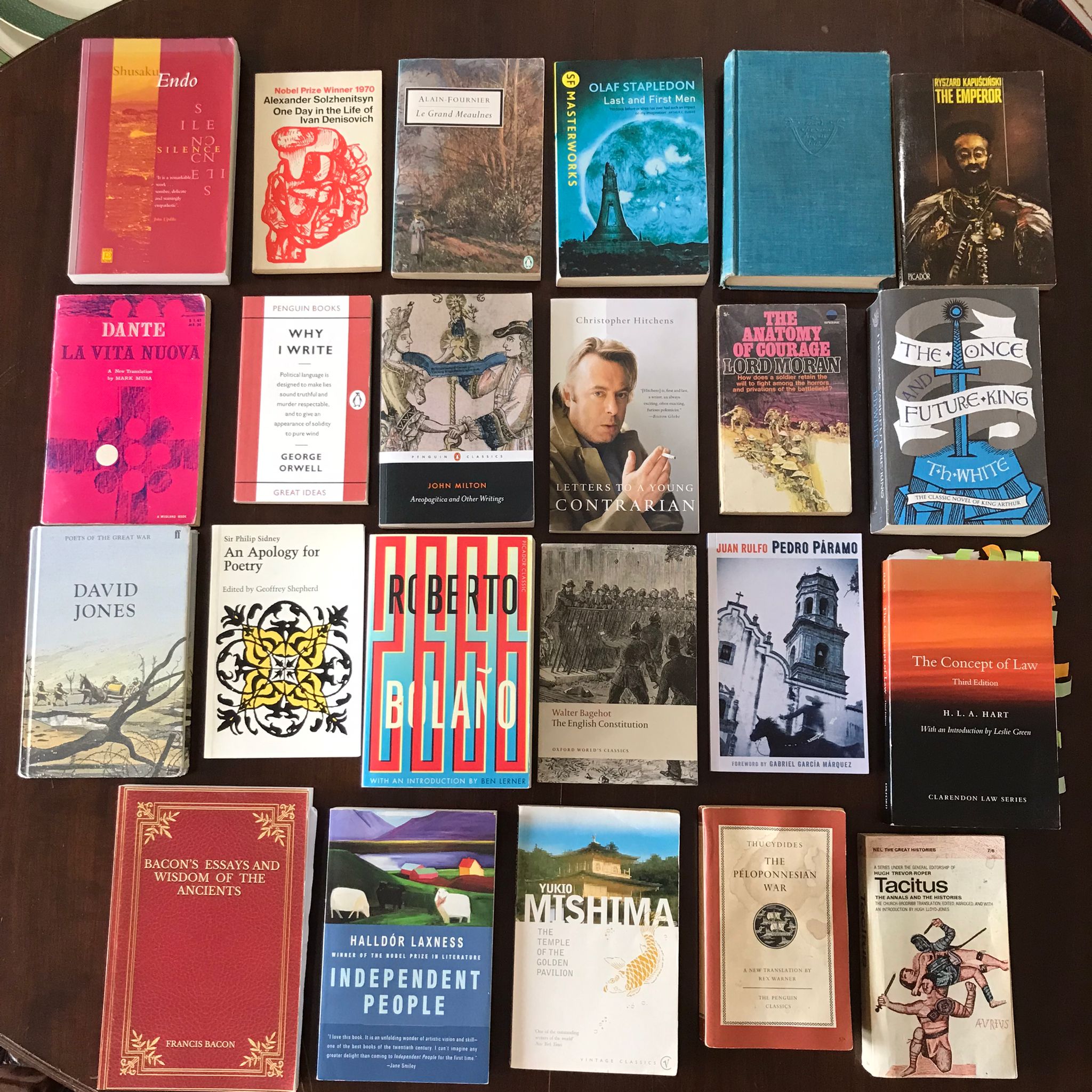There are over 130 million unique books in the world.
You can read any of them, but you can't read all of them. So choose wisely.
Here are 23 you might want to consider (and why):

There are over 130 million unique books in the world.
You can read any of them, but you can't read all of them. So choose wisely.
Here are 23 you might want to consider (and why):

Orwell was the greatest essayist of the 20th century. He writes with a clarity which has stood the test of time.
This short volume, Politics & the English Language particularly, which will teach you more about writing than anything else.

The novel that inspired Gabriel García Márquez. One of the finest works of the Latin American literary canon.
Brief, haunting, beautiful. It will stay with you forever.

My favourite version of the Arthurian legends, imaginatively reworked into an instructive tale for young people.
Epic, profound, funny, moving, and deeply moral.
A book all young people should read.

An account of the rise and fall of Emperor Haile Selassie in Ethiopa.
One of the great works of political insight, and a shining example of real journalism.

A novel about Jesuit missionaries in 17th century Japan. Scorsese's film adaption is highly commendable.
One of the great treatises on suffering and how it can be endured. Timeless.

If ever anybody asks, "what's the point in poetry?" point them to this.
It's a furious and powerful argument for the value of poetry which strikes at the heart of all creative endeavour.

Science fiction at its very best. This book will, unlike many others to which this cliche is applied, blow your mind.
Stapledon thought and wrote on a scale way beyond most people.

History at its finest. This is Tacitus' wry, perceptive, shrewd account of the Roman Empire from the reign of Tiberius through to Nero.
His portrayal of the political and the personal is second to none.

The ultimate novel of youth. And the fact that its author died a year later during the First World War, at just 27 years old, only cements that status.
Required reading for anybody coming to the end of their teenage years.

Lord Moran was Winston Churchill's personal doctor, and had himself had served in WW1.
In the Anatomy of Courage he explores the psychological impact of war with a scientific - but always humane - mode of analysis.

Published when Dante was still a young man, far from the mature poet who wrote the Divine Comedy.
A combination of prose, poetry, and theology, this short work is an uncategorisable, vivid meditation on love and grief.

Sir Francis Bacon was the father of modern science, a rational and clear thinker decades ahead of his time.
His essays offer profound and timeless wisdom. Bacon is somebody you should want to learn from.

A novel which explores the lives of Icelandic sheep farmers in the early years of the 20th century.
Austere, epic, unforgiving, and deeply moving. There's a reason Laxness won the Nobel Prize in Literature.

TE Lawrence, better known as Lawrence of Arabia, recounts the Arab revolt against the Ottoman Empire during the First World War in vivid, flowing prose.
A work of history which will be read and analysed for centuries.

There's just something about Mishima. He was a man whose art & life were one and the same.
Strange, stirring, enchanting; few novelists captured the magnitudes of passion and emotion like Mishima.

An epic poem of the First World War told by a man who fought in it. One of the great forgotten works of the 20th century.
A mix of prose & lyrical poetry with allusions to Medieval legend and cockney slang. Unique.

An instructive work for young people from the late, great Christopher Hitchens.
Doesn't matter whether you agree with him. This is about how to think and write. Needed now more than ever.

It is impossible to know which 21st century novels will be remembered as the greatest of our age.
But this is the one I'd bet on. It's like nothing you've ever read before.

One of the greatest defences of free speech ever written, as relevant now as it was in the 17th century.

My chemistry teacher gave me a copy of this book years ago. At the time I didn't understand. I do now.
A short, sobering account of mankind's capacity for tyranny.

Not just a vital work of legal philosophy, but one of the most well-written books ever published.

For anybody who wishes to understand the British political system, this book is unavoidable.
I dare say there a few British politicians who could do with giving it a go...

Herodotus may have been the Father of History, but Thucydides was the founder of political history.
Its insight into Ancient Greek politics will teach you more about modern politics than any recent book.

This list is somewhat 20th century heavy, and it isn't definitive, of course.
I wanted to include books you might not have heard of, rather than the obvious candidates.
Alas, what would you recommend, from the 130 million or more books in existence?